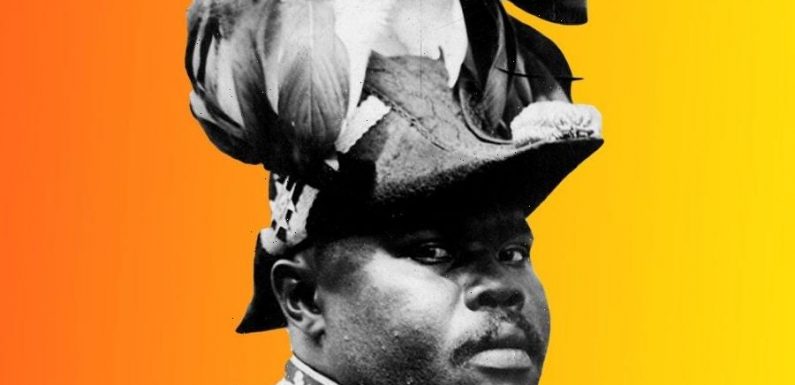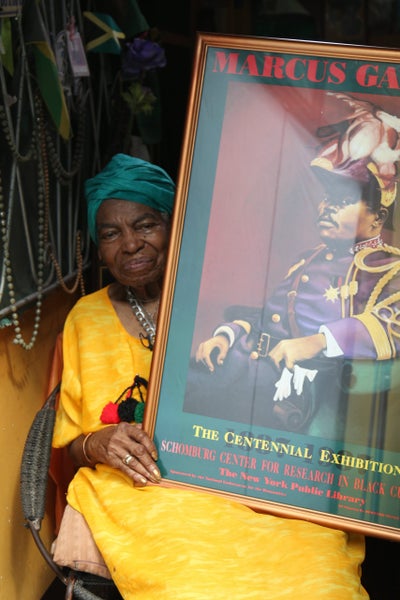
In the opening moments of “African Redemption: The Life and Legacy of Marcus Garvey,” the weighty voice of Keith David is followed by Steel Pulse’s “Worth His Weight In Gold.” The late activist Marcus Garvey, who inspired the song, was born 135 years ago today. The film looks to prove Garvey was indeed a man of value and vision.
The documentary chronicles the life of the revolutionary and is making its New York City premiere today in Harlem. August 17 will also officially be proclaimed “Marcus Garvey Day” in the state of New York.
“I’m all about telling these underrepresented stories of our people and the theme that resonated through all the documentaries that I’ve done so far is resistance…Marcus Garvey is the epitome of resistance,” the film’s director, Roy T. Anderson, tells ESSENCE. “He has an imprint all over the world and today the manifestation of movements like the Black Lives Matter. Garvey is essential to that,” he also says.
Garvey was the leader of Pan-Africanism, a Black nationalist ideology that sought to unite people of African descent worldwide. Through his teachings, Garvey also promoted self-sufficiency and economic independence.
“Marcus Mosiah Garvey came and brought the African consciousness of the Roaring Twenties,” Dr. Leonard Jeffries, Past Chair of the Black Studies Department at City College, says in the film. “Harlem was not a dead community. It was a community ready for rebirth. And so the new Negro and Harlem Renaissance and all of that came at the time that Garvey was bringing this larger picture that were connected globally.”
Article continues after video.
https://youtube.com/watch?v=q_kb6wcgjEk%3Ffeature%3Doembed
Since Garvey’s death in 1940, his messages have been spread through means beyond books and essays. Musicians, particularly reggae artists, have shared the late leader’s ideas with the masses.
“As artists, we are custodians of oral history and culture. So for as long as Marcus Garvey’s teaching and philosophy is relevant, the people of culture and music have to somehow keep recording it,” singer Chronixx says in the film.
Of course, Garvey’s impact expands far beyond entertainment. Other notable names that appear in the film and have been influenced by philosophies include Dr. Greg Carr, Chair of African American Studies at Howard University, Sir Hilary Beckles, Vice Chancellor of The University Of The West Indies and Ilyasah Shabazz, the daughter of Malcolm X.
Shabazz’s appreciation for Garvey is in her bones. Malcolm X’s parents (Shabazz’s paternal grandparents) were supporters of Garvey. In fact, in 1927, Malcolm Little Sr. filed an appeal to President Calvin Coolidge for Garvey’s release from prison after he was convicted of mail fraud four years earlier.
Garvey was convicted in connection with the operation of The Black Star Line, his program for Black economic independence. He was imprisoned and eventually deported to his native Jamaica in 1927. He never returned to the U.S.
There has been a decades-long call for a posthumous presidential pardon of Garvey by his living descendants and supporters. A new Change.org petition, which was also launched today, is the latest effort to clear his name. The goal is to obtain at least 100,000 signatures in three days and present it to the Biden Administration.
“In 1923, Garvey was arrested and charged with mail fraud. It was widely known to be trumped-up charges,” the petition reads.
The FBI later acknowledged that their probing of Garvey was to eventually “deport him as an undesirable alien.”
Anderson spent nearly six years working on the documentary and interviewed over 100 people, including Danny Glover, Louis Gossett, Jr., Usain Bolt and Sean Paul. Filming took place across Jamaica, Ghana, Canada and the United States, further speaking to Garvey’s global influence. With the launch of the petition and the premiere of the documentary, Anderson hopes that the film will make a change, just as Garvey did.
“Marcus Garvey was all about impacting lives, I mean not just in the Caribbean, not just in Africa, but in other countries, in America as well. And, I would dare say that I believe he made his greatest greatest impact in these United States of America, from the Mecca of it all, Harlem,” Anderson says.
“African Redemption: The Life and Legacy of Marcus Garvey” will be screened at Harlem’s Marcus Garvey Park on August 17 at 7pm EST. It will then be made available to classrooms around the world via a partnership with academic research site Proquest.
Source: Read Full Article
